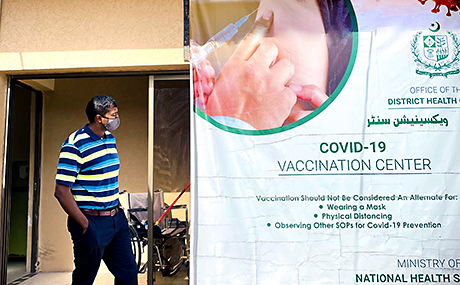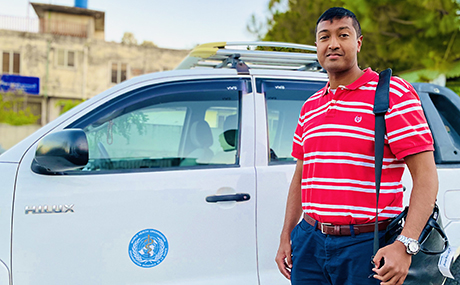Ask Osman Ulvi about Pakistan, and his heart will swell with pride as he recalls childhood visits to see his beloved Nani-Jaan (grandma) and ancestral homeland.
The tugs of the heart are strong for the energetic doctor who was born and raised in Cleveland to parents who emigrated to the U.S. So, it was only natural that he'd look to Pakistan for medical school when he began his career journey. And then, 11 years later, he'd return to help the world's fifth-most populous country battle its third wave of COVID-19.
 With India at its southeast border, Pakistan faces challenges to curbing the pandemic. As of May 1, only 2% of its population has been vaccinated and its active cases have gone from a low of 16,000 in early March to more than 140,000 new cases in April.*
With India at its southeast border, Pakistan faces challenges to curbing the pandemic. As of May 1, only 2% of its population has been vaccinated and its active cases have gone from a low of 16,000 in early March to more than 140,000 new cases in April.*
"I felt it was my duty to assist," explained Ulvi, who earned his master of public health degree from BW in 2020. "I contacted a friend who works for the Government of Pakistan's Ministry of National Health Services Regulations and Coordination. He was able to facilitate my application and was excited to have me serve as a visiting field epidemiologist and surveillance officer.
"One of my first projects involved patient flow and efficiency at one of our vaccinations centers. With the knowledge I acquired from the front-line healthcare workers and patients, I was able to bring their concerns to the appropriate leadership," said Ulvi.
"Within a week, we were able to increase the size of the waiting and post-vaccination observation room to ensure adequate social distancing, organize the ticketing system and establish greater communication between all stakeholders," he went on to say.
 "Professionally, I have learned a lot and been able to utilize the knowledge I acquired at BW," he noted. "At the personal level, I've been given the opportunity to be part of history and do my part in the COVID-19 response. This brings me tremendous joy."
"Professionally, I have learned a lot and been able to utilize the knowledge I acquired at BW," he noted. "At the personal level, I've been given the opportunity to be part of history and do my part in the COVID-19 response. This brings me tremendous joy."
While Ulvi was in medical school, a massive earthquake shook Pakistan - killing 100,000 people and injuring 138,000. A shocking 3.5 million people lost their homes. Ulvi's medical school was deployed to help.
"I helped provide immediate medical assistance. While that was rewarding, I saw there was so much more the victims needed to become whole again. That help came from the public health agencies - the World Health Organization partnering with local and international groups," he noted. "Watching these organizations deploy strategic planning and crisis management and deliver care to those who needed it was the most meaningful and inspiring experience of my life. It was then that I discovered my passion for public health."
In Northeast Ohio and overseas, Ulvi is involved with healthcare organizations focused on helping individuals in need. He volunteers at orphanages and homeless shelters as well as with several programs promoting health and hygiene in rural areas of Pakistan.
"There is so much need throughout the world," he emphasized. "Whether here in Northeast Ohio or abroad, public health is a bridge to help improve the lives of individuals. To me, healthcare is a human right, not a privilege."
*According to the British Broadcasting System